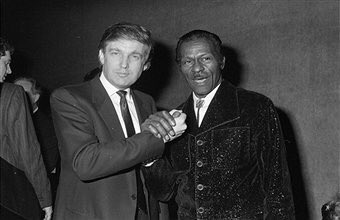Charles Edward Anderson "Chuck" Berry October 18, 1926 – March 18, 2017
by glenster 16 Replies latest social entertainment
-
-
-
-
glenster
Dick Clark All Star Band 1977
https://www.youtube.com/watch?v=36HrXhmu0SQ -
BluesBrother
What a legend !
Sadly he is with us no more but he leaves a catalogue of music that will always be with us. Truly he was one of the founding fathers of modern music and whether the "young folks" know it or not we all owe him big time.
A flawed character perhaps but ,hey, doesn't death mean that your sins die with you?
-
-
glenster
"flawed character perhaps but ,hey, doesn't death mean that your sins die
with you?"In 1944, while still a student at Sumner High School, he was arrested for
armed robbery after robbing three shops in Kansas City, Missouri, and then
stealing a car at gunpoint with some friends. Berry's account in his autobio-
graphy is that his car broke down and he flagged down a passing car and stole it
at gunpoint with a nonfunctional pistol. He was convicted and sent to the Inter-
mediate Reformatory for Young Men at Algoa, near Jefferson City, Missouri, where
he formed a singing quartet and did some boxing. The singing group became com-
petent enough that the authorities allowed it to perform outside the detention
facility. Berry was released from the reformatory on his 21st birthday in 1947.But in December 1959, he was arrested under the Mann Act after allegations
that he had sexual intercourse with a 14-year-old Apache waitress, Janice
Escalante, whom he had transported across state lines to work as a hatcheck girl
at his club. After a two-week trial in March 1960, he was convicted, fined
$5,000, and sentenced to five years in prison. He appealed the decision, arguing
that the judge's comments and attitude were racist and prejudiced the jury
against him. The appeal was upheld, and a second trial was heard in May and June
1961, resulting in another conviction and a three-year prison sentence. After
another appeal failed, Berry served one and one-half years in prison, from
February 1962 to October 1963. He had continued recording and performing during
the trials, but his output had slowed as his popularity declined; his final
single released before he was imprisoned was "Come On".In the late 1980s, Berry bought The Southern Air, a restaurant in Wentzville,
Missouri. In 1990 he was sued by several women who claimed that he had installed
a video camera in the bathroom. Berry claimed that he had the camera installed
to catch a worker who was suspected of stealing from the restaurant. Though his
guilt was never proved in court, Berry opted for a class action settlement with
59 women. His biographer, Bruce Pegg, estimated that it cost Berry over $1.2
million plus legal fees. During this time Berry began using Wayne T. Schoeneberg
as his legal counsel. Reportedly, a police raid on his house found videotapes of
women using the restroom, as well as one minor. Also found in the raid were 62
grams of marijuana. Felony drug and child-abuse charges were filed. In order to
avoid the child-abuse charges, Berry agreed to plead guilty to misdemeanor
possession of marijuana. He was given a six-month suspended jail sentence and
two years' unsupervised probation and was ordered to donate $5,000 to a local
hospital.In November 2000, Berry faced legal issues when he was sued by his former
pianist Johnnie Johnson, who claimed that he co-wrote over 50 songs, including
"No Particular Place to Go", "Sweet Little Sixteen" and "Roll Over Beethoven",
that credit Berry alone. The case was dismissed when the judge ruled that too
much time had passed since the songs were written.
https://en.wikipedia.org/wiki/Chuck_Berry
